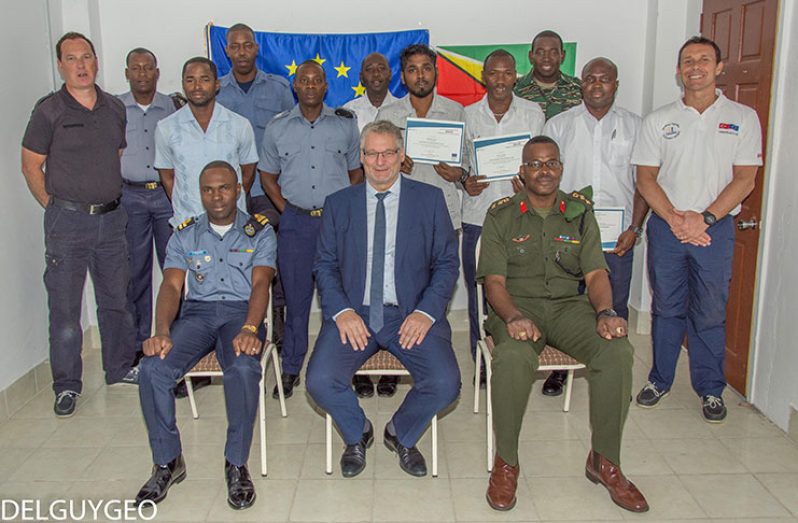LAWMEN here wrapped up a four-day training in search-of-vessels under the European Union’s Seaport Cooperation programme (SEACOP), which took place at the Guyana Coastguard base in Kingston, Georgetown.The course was provided to officers from the Coastguard, Customs Anti-Narcotics Unit, and the Guyana Police Force. The instructors were officers from the UK Border Force. SEACOP is a programme to train and equip inter-agency units to identify, search and interdict all forms of maritime trafficking, the EU office here said in a release. It added that SEACOP improves the capacity of law enforcement agencies in monitoring maritime trafficking and detecting illicit maritime cargoes on board suspect vessels. Access to databases and regional and inter-regional networks of partners is designed to move law enforcement towards an intelligence-led approach that will help reduce the trafficking of cocaine.
The training which culminated on Friday saw EU Ambassador Jernej Videti? presenting the nine participants with their certificates. In brief remarks, Videti? said that he hopes the training received will enable the participating agencies to better police Guyana’s waterways against the trade of illicit drugs.
The Seaport Cooperation Project will run until December 2018 with a budget of €6 million, and will cover selected countries in Africa, Latin America and the Caribbean. During the first two phases beginning in 2010 the project was focussed on West Africa, where it set up a network of Joint Maritime Control Units (JMCUs) in strategic seaports.
Intercepting drug and other illicit cargoes is a critical component of the Cocaine Route Programme, a series of interconnected programmes funded out of the EU Instrument Contributing to Stability and Peace. Drug traffickers are continuously modifying their routes in response to law enforcement activity. Having established effective units in West Africa, the project is now extending into a number of new countries in Latin America and the Caribbean, including Guyana, to reflect continuous changes in trafficking routes.
On 30 November 2016, Guyana joined 26 countries in Africa, Latin America and the Caribbean in signing a Memorandum of Understanding for the implementation of SEACOP. SEACOP is implemented on behalf of the European Union by the Spanish international cooperation agency Fundación Internacional y para Iberoamérica de Administración y Políticas Públicas (FIIAPP).
The first SEACOP specialised training event in Guyana shall take place from 6-10 March for nine law enforcement officials from CANU, the Guyana Police Force and the Guyana Defence Force Coast Guard. The training will be conducted by experts from the UK Border Force Agency. The course will focus on delivering advanced search techniques for a range of vessels. This will establish a multi-agency Joint Maritime Control Unit (JMCU) in Guyana, dedicated to the search of vessels. In addition, the project will donate specialised equipment and search tools to the JMCU. A series of mentoring events will follow in subsequent years.
A second course is planned to be delivered jointly with Jamaican officers in late March 2017, in Jamaica. This course will be conducted by UK National Crime Agency maritime experts. It will be delivered to four vetted officers from Guyanese and four vetted officers from Jamaican law enforcement agencies. This course will be focused on advanced maritime intelligence training, providing access to key international partners. The course will create a Maritime Intelligence Unit (MIU). Officers participating in this course will be invited to attend an annual mentoring event attending by all MIU-trained teams participating in the project, with a view to promoting transregional working practices. An annual conference will also be convened to promote transregional networks.
The Cocaine Route Programme
The EU’s Cocaine Route Programme, in operation since 2009, has been a strategic response to the threat from drug trafficking and organised crime to the countries along the route from source to market. Through a number of interconnected and complementary projects the Cocaine Route Programme supports the capacity of partners along the route in combating the manufacture of and intercepting the flow of drugs, fighting money laundering and sharing information. The Cocaine Route Programme operates in over 40 countries and has a budget in excess of €50 million from the EU Instrument Contributing to Stability and Peace.




.png)









